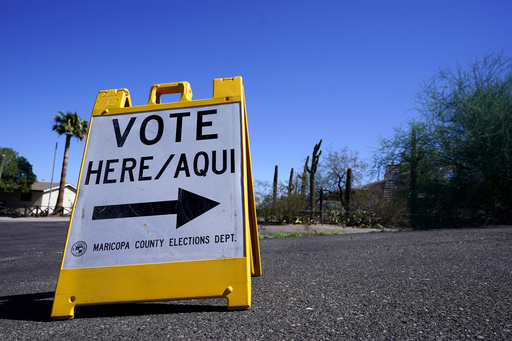
PHOENIX — A judicial ruling has dismissed a petition that aimed to compel Arizona’s 15 counties to authenticate the citizenship of approximately 42,000 voters registered solely for federal elections. The judge determined that the request was made too close to the upcoming November 5 election and stated that the plaintiffs lacked legal standing.
The lawsuit was initiated on behalf of an Arizona citizen alongside the conservative group Strong Communities Foundation of Arizona, who sought a court directive mandating county recorders to reach out to federal agencies for verification of these voters’ citizenship.
In Arizona, voters must present proof of citizenship to partake in local and state elections. Those who fail to provide such proof but affirm their U.S. citizenship may still vote in presidential and U.S. congressional elections.
The lawsuit claimed that local officials were neglecting to adhere to a 2022 statute, which necessitated the cross-referencing of voter registration data with various governmental databases.
U.S. District Judge Krissa Lanham, a nominee of President Joe Biden, stated in her ruling on Friday that the plaintiffs had not demonstrated a significant risk or shown that their requested action could be executed amid an ongoing election cycle.
Judge Lanham emphasized that it would be impractical to divert county resources from election preparations to conduct citizenship verifications shortly before Election Day.
The plaintiffs have indicated their plans to appeal the decision. America First Legal, an organization led by former Trump advisor Stephen Miller representing the plaintiffs, released a statement asserting the appeal was initiated to ensure the lawful removal of potential illegal immigrants and noncitizens from Arizona’s voter rolls.
Maricopa County Recorder Stephen Richer’s spokesperson, Taylor Kinnerup, chose not to provide comments regarding the judge’s ruling.
The lawsuit maintained that merely consulting existing databases was insufficient and that county officials should explicitly request federal verification of these voters’ citizenship.
After noting that federal regulations prevent systematic voter list purges within 90 days of an election, the plaintiffs amended their request to merely asking for correspondence with federal officials to verify the citizenship status of voters registered for federal elections. They clarified they did not seek the removal of anyone from voter lists.
The 42,000 voters discussed in the lawsuit are distinct from a larger cohort of individuals whose citizenship has not been established but who are still permitted to vote in local, state, and federal elections this November, according to Secretary of State Adrian Fontes’ office.
Recently, a database error was discovered, erroneously categorizing nearly 98,000 voters as eligible for a complete ballot despite unverified citizenship status.
Driver licenses issued post-1996 qualify as valid proof of citizenship. However, this system error initially affected a group of voters with pre-1996 licenses, incorrectly labeling them as authorized to vote in state and local contests.
The state Supreme Court has determined that these voters, already qualified to participate in federal elections, are also entitled to vote in state and local elections in the upcoming 2024 general election.
Shortly thereafter, the count of misclassified voters surged from nearly 98,000 to approximately 218,000. The office of Fontes has reiterated that all individuals impacted by this database error maintain their eligibility to vote in full elections.
